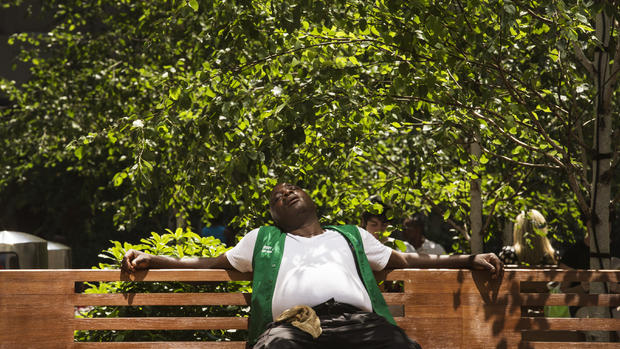Heat wave brings punishing temperatures to millions on East Coast
(CBS News) The eastern United States was dealing with a fourth day of punishing heat wave Wednesday, leaving tens of millions under threat from the hottest weather of the summer.
A dome of high pressure was sitting over a huge area stretching from the East Coast to the Ohio Valley to the Great Lakes.
Highs in the mid-90s were expected in Washington, D.C., and Virginia, with heat indexes in the triple digits. New York City could set a record for power usage with a triple-digit heat index.
Meteorologist Kate Bilo of CBS Philadelphia station KYW-TV reported on "CBS This Morning" that the City of Brotherly Love has already experienced three days of temperatures above 90 degrees.
This week is typically the hottest week of the year for Philadelphia, Bilo reports, adding that the weather will get worse before it gets better with Thursday looking like the hottest day with a temperature of 98 degrees and a heat index of 110 degrees on Thursday and Friday.
"Here in Philadelphia, we have a unique challenge: a lot of historic, brick rowhomes," said Bilo. "They retain a lot of heat. They don't cool down overnight. Many folks without air conditioning, it can be a very dangerous situation."
Water cut off in D.C. suburb amid sweltering heat wave
Power, water shortage worries in sweltering heat wave
"Dangerous" heat wave descends on East Coast
The heat wave was linked to the dome centered over the eastern United States. That's a ridge of high pressure that's usually in the southern Plains this time of year, but there's a storm there, leaving the ridge with no other place to go than the East Coast, Bilo reports.
The dome isn't moving for the next several days, pumping more moisture from the Gulf of Mexico into the East, Bilo reports. With humidity being pumped in, heat index values will soar.
Physics professor Michio Kaku of the City University of New York said on "CBS This Morning" that heat domes are huge, stagnant masses of hot, humid air that can linger for days or weeks, sealing in heat and suppressing cloud formation, which lets sunlight in and makes weather conditions hotter.
(Watch Michio Kaku discuss the heat wave on "CBS This Morning" at left)
"Now, the good news is they are temporary," he said. "Eventually the dome breaks up. The jet stream pushes them out to the ocean, so the good news is it'll pass."
In New York, meteorologist Elise Finch of CBS station WCBS-TV reports that the heat dome has been blocked from moving by a high-pressure system offshore from the East Coast.
Watch CBS meteorologist Kate Bilo break down the heat wave in the player above
